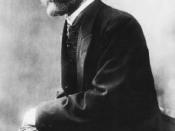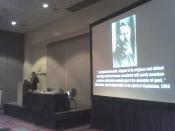Like his French counterpart, ÃÂmile Durkheim, Max Weber (1864-1920) was interested in scholarly disputes about method and theory in sociology, as he writes in The Methodology of Social Science: "Only by identifying and solving objective problems were sciences established and their method further developed; never, on the other hand, have epistemological or methodological considerations been decisively involved" (Weber, 1904, p145). Weber was influenced by the German sociologist Wilhelm Dilthey (1833-1911), who articulated the distinction between natural science and social science. Should the latter follow the natural sciences and embrace a positivist theory of knowledge, or should it recognize itself as a moral and cultural science dedicated to the interpretation of social life? He dedicated a significant part of his work to providing answers to these questions. His intrinsic scholarly superiority, as a comparative approach to macrosociological investigation, over reductionist Marxism and ahistorical structural functionalism maintains a large interest in his work among scholars (Roth, p.xvi
in Bendix, 1977). There are also political and epistemological reasons for Weber's continued importance. As a researcher probing into the relations between ideologies and social structures, and as a methodologist concerned with the relations of values and facts, Weber must remain controversial in the battles, inside and outside the academy, about the purpose and consequences of social knowledge for polity and society - empirical study is never an innocent or neutral undertaking (Roth, p.xvii in Bendix, 1977). I will begin by specifying Weber's ontological and epistemological assumptions alongside the contemporary debates on method and theory that influenced him. Moreover, to illustrate his metatheoretical position, I will attempt to relate it to some of his main concepts, such as ideal types, valuation, interpretative understanding (Verstehen) and singular causal analysis.
Weber adopted some aspects of the Baden School's - which focused on logic and science -...


